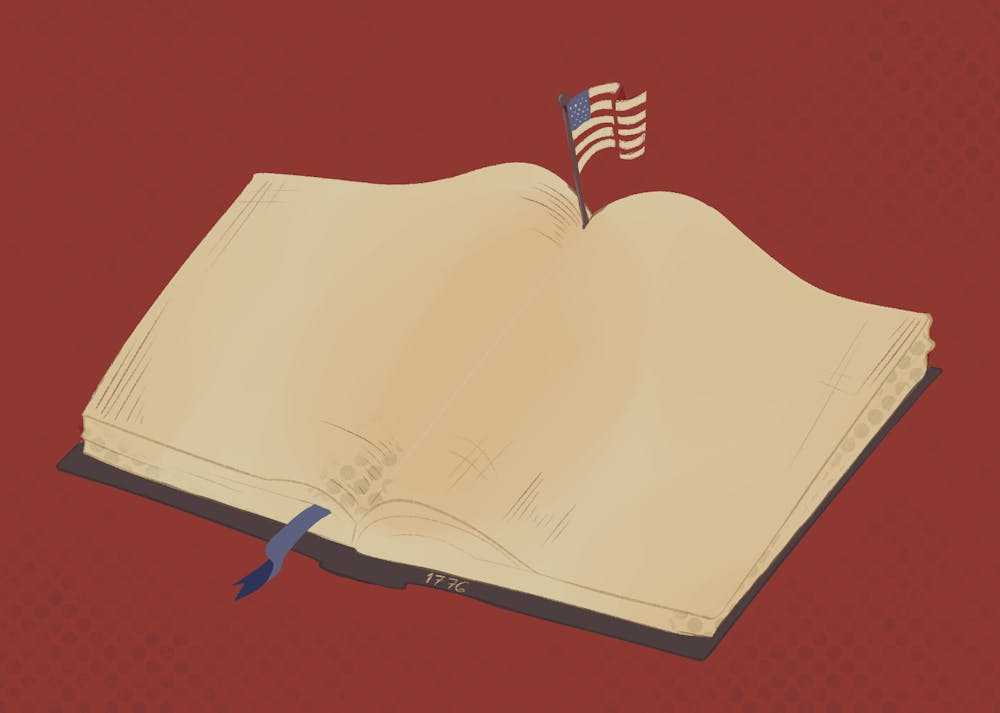ASU requires a history class for all undergraduates, so students can develop useful knowledge of the past to shape the present and future.
Last month, President of the American Historical Association James Sweet received considerable backlash for warning against the opposite – shaping the past with knowledge of the present.
“Too many Americans have become accustomed to the idea of history as an evidentiary grab bag to articulate their political positions,” he said, while considering the historical accuracy of the 1619 Project by the New York Times. The initiative, which began as a journalistic reframing of American history through the lens of slavery, was later turned into a high school curriculum in partnership with the Pulitzer Center.
He apologized. He should not have. When experts are afraid to say what they know is true, we're left hearing the loudest voices in the room, whether they're correct or not. We should be critical of what we’re being told and by whom and should consider what they may have to gain.
In January 2021, the American Historical Association did not apologize when they condemned former President Donald Trump’s 1776 Commission, claiming their report called for "a form of government indoctrination of American students" and was full of “falsehoods, inaccuracies, omissions, and misleading statements." It additionally failed to mention Indigenous communities and excluded women and enslaved people. As, the AHA implies, the Founding Fathers would have intended.
That commission was chaired by Larry P. Arnn, president of Hillsdale College, the source for the Hillsdale 1776 curriculum which Kari Lake, Republican candidate for Arizona governor, intends to align with Arizona state curriculum standards.
"The governor indicating and dictating to school districts which curriculum they use would be really unprecedented,” said David Garcia, associate professor at the Mary Lou Fulton Teachers College. “And I would imagine, as a matter of principle, both parties should be opposed to that."
Garcia was also the former Democratic nominee for governor of Arizona, having lost to Doug Ducey in 2018. As a strong advocate for public schools, he ran on education.
As a representative for the Mary Lou Fulton Teachers College, however, he seemed ambivalent about how the gubernatorial election may affect Arizona schools, including ASU. He said the best school systems in the world teach the ability to learn how to learn, and that curriculum is less important than ensuring students are competent. He also shrugged off any concern that a governor would interfere with ASU curriculum.
“What would need to happen for the governor to censor what I write tomorrow?” Garcia said. “The role of Arizona State from an economic and development perspective would outweigh, in my opinion, what would be a small-minded fight about the content of any one particular class.”
That ambivalence, like Sweet’s apology, is troubling.
According to the American Association of Colleges and Universities, seven states have already imposed restrictions on teaching at the college and university level, and 28 states have introduced bills with the same intent.
Censorship can also happen without official policy. Educators can be gaslit or intimidated– tactics used by many of the people Lake's rhetoric is meant to energize.
Until the language was updated this week, Lake's official campaign website promoted the Hillsdale 1776 curriculum, to “end the progressive indoctrination” of the 1619 Project curriculum, and that “Arizona schools should not be used as factories to churn out deliberately mis-educated progressive activists.”
Might she include ASU among those schools? Her campaign did not respond to inquiry.
Kassidy Wheeler, senior majoring in political science and justice studies and social chair for ASU Young Democrats, believes promoting any partisan curriculum is dangerous.
“I don’t necessarily think any politics should be involved in school, leftist democratic politics included,” Wheeler said.
Wheeler, who attended Arizona public schools, said it’s more important to introduce comparative ideas than to limit studies to a dominant culture’s perspective.
“I never learned about the treatment of Indigenous Americans when it came to the poisoning of their water supplies and taking their land," Wheeler said. "As a student in Arizona, I didn’t learn about that until I got to college."
Isaac Humrich, sophomore political science major and president of College Republicans at ASU, is also a product of Arizona public schools.
He is a conservative and has supported Republican candidates for years. While he supports Lake’s bid for governor, he has less of a problem with schools adopting the 1619 project curriculum.
“It allows us to have conversations,” Humrich said. “And then, hopefully, those conversations allow us to get maybe not to the truth of the matter, but closer to the truth of the matter.”
Lake has been justifiably critical of Katie Hobbs, her Democratic opponent, for dodging a debate meant to do just that. It distracts from substantive issues, like Lake’s support of a politically slanted curriculum and what that could mean for Arizona.
The governor appoints 10 of the 11 members of the Board of Education. The Republican candidate for the only elected seat, the Superintendent of Public Instruction, is Tom Horne. His official campaign website is more incite-full than insightful. While he promises to increase student performance in reading and math, he somehow manages to fail at both.
For example, on Aug. 15, he incorrectly cited the Washington Post, saying “(t)he number of unarmed people shot by police per year is about 17." In fact, their reporting shows 456 unarmed people have been shot and killed by police since 2015. That’s over 65 people per year. Is this “mis-education”? We must question sources of information as well as their motives, and we must call out false or misleading information.
This extreme political rhetoric is a direct threat to educational institutions. When experts and academic leaders choose apologies and ambivalence over conviction, it is as if they aren’t showing up to the debate.
Edited by Sadie Buggle, Wyatt Myskow and Kristen Apolline Castillo.
Reach the columnist at jdbrow52@asu.edu and follow @jamesbrownasu on Twitter.
Editor's note: The opinions presented in this column are the author's and do not imply any endorsement from The State Press or its editors.
Want to join the conversation? Send an email to opiniondesk.statepress@gmail.com. Keep letters under 500 words and be sure to include your university affiliation. Anonymity will not be granted.
Like The State Press on Facebook and follow @statepress on Twitter.

James Doyle Brown, Jr. is an opinion columnist at The State Press. He is also in his final semester as a graduate student studying investigative journalism at the Walter Cronkite School of Journalism and Mass Communication. He has previously reported for the State Press politics desk, The Howard Center of Investigative Journalism and Carnegie-Knight News21.




